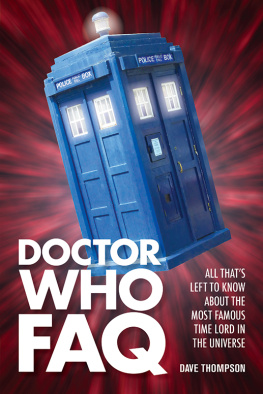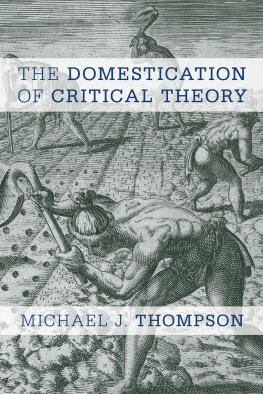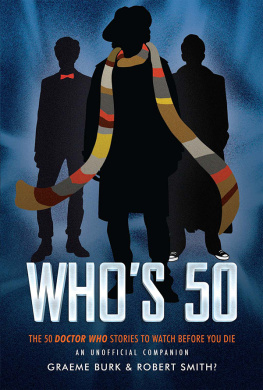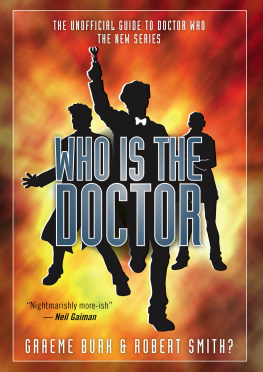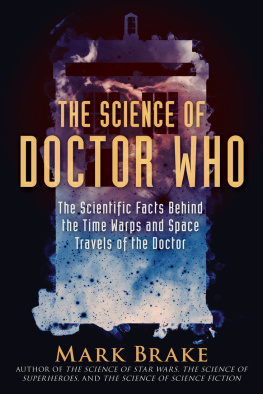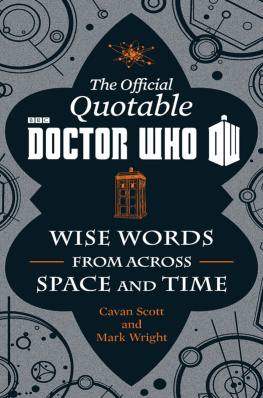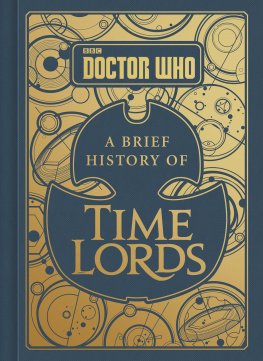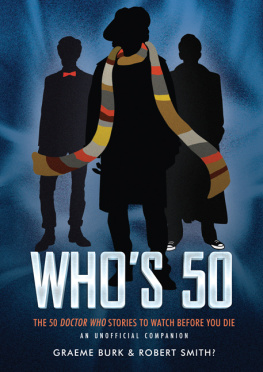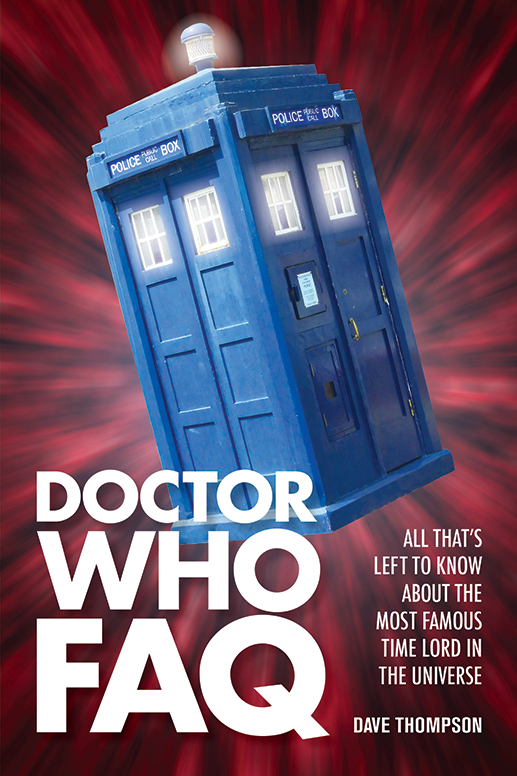
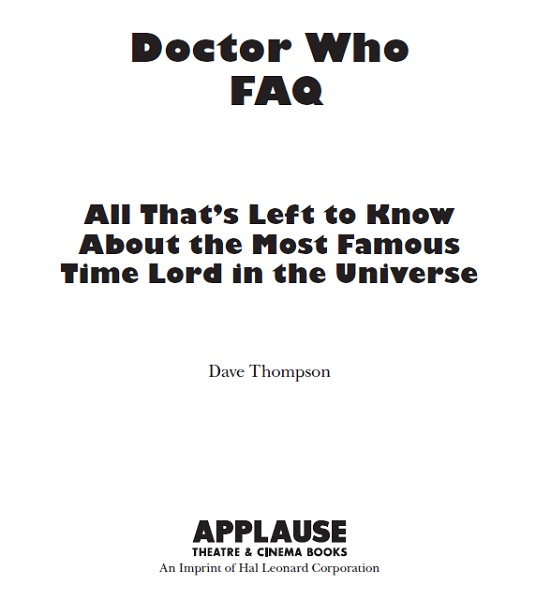
Copyright 2013 by Dave Thompson
All rights reserved. No part of this book may be reproduced in any form, without written permission, except by a newspaper or magazine reviewer who wishes to quote brief passages in connection with a review.
Published in 2013 by Applause Theatre and Cinema Books
An Imprint of Hal Leonard Corporation
7777 West Bluemound Road
Milwaukee, WI 53213
Trade Book Division Editorial Offices
33 Plymouth St., Montclair, NJ 07042
The FAQ series was conceived by Robert Rodriguez and developed with Stuart Shea.
All photos are from the authors collection except as noted.
Library of Congress Cataloging-in-Publication Data is available upon request.
ISBNs: 978-1-4803-4295-8 (epub); 978-1-4803-4296-5 (mobi)
www.applausebooks.com
To my mother, Sheila Ann Thompson,
for never telling me to turn it off
Contents
T he first thing that any person approaching Doctor Who for the first time cant really help but notice is that Doctor Who is very, very big.
The show debuted on November 23, 1963, the day after President Kennedy was assassinated, so the same day that most people in Britain learned the news. There have been, if you count the various spin-off shows, near as dammit, a thousand episodes since. Even shopping around, if youre American itll cost you about $4,000 to buy them all on DVD.
It would represent an excellent investment.
Doctor Who is, quite simply, one of the greatest things known to man. I dont mean on TV. Its up there with sunshine and chocolate cake.
And please dont mistake it for cult television, some precious flower of a show that a handful of people watch thats always on the verge of cancellation and the TV execs just dont understand, boo hoo. It was that at one point, true. Some recent episodes of Doctor Who have been watched by a quarter of the UK population. Those are Superbowl numbers. Rival channels dare not schedule Britains Got Talent or The X Factor against it. Its watched by very young children and their grandparents, in the same room at the same time. On December 25 every year, it has become a British tradition for families to gather, eat a special meal, exchange presents, and watch a new episode of Doctor Who. In 2011 the Archbishop of Canterbury referred to the Doctor Who story The Happiness Patrol in the second paragraph of his Easter sermon. The Resurrection got a mention in para 4.
You may be put off by this. You may be thinking that something with such wide appeal cant possibly be for you, and your refined tastes. Well, Id respect that position a bit more if you werent wearing the same T-shirt you wore yesterday, but its a fair point and it cuts to the real appeal of Doctor Who.
In his eulogy for Douglas Adams (who used to be the script editor of Doctor Who, by the way; he wrote three stories), Stephen Fry (who played the Minister of Chance in the story Death Comes to Time and has written a script for the new series) classed the writer as one of those artists like Bach (the Doctor plays some Bach on his reed flute in The Power of Kroll), William Blake (a traveling companion of the Doctor no, really), or Eddie Izzard (er no wait. Seriously? No Doctor Who link? Thats weird) who makes you feel like youre the only person in the world who really gets them; you get a connection. Doctor Who is like that. It has provoked fans to admit that they love it in the same way they love a person, to confess to crying in public at the mere memory of a particular moment.
In one of the more recent episodes, The Shakespeare Code, Shakespeare flirts with the Doctor and our hero declares fifty-seven academics just punched the air. I watched it with a room of Shakespeare scholars, two of whom have written books about him. The air had been punched long before the Doctor said that. Academic papers were written.
You still have your doubts. You want to see some evidence? OK.
You know how people who are writing introductions are meant to say things like I couldnt put this book down? Well, keep this book firmly in your hand, but go over to your computer. OK. Look up this YouTube video: http://tinyurl.com/9r8j3tq. In this video, a couple of young female fans of Doctor Who watch a sequence from the episode Utopia and react as they see fit. The title of the video is Whogasm.
Now for some context: that story only ranked the twenty-seventh best in the 2009 Doctor Who Magazine survey. It didnt make the top three stories that year.
Thats how good Doctor Who is.
But now you can see the problem: you want to give this Doctor Who youve heard about a try. You always knew there was a lot of it, and you found that a little off-putting, but now its clear that theres a far greater danger and its that youan unwary, unprepared traveler encountering Doctor Who for the first timemight literally die in the throes of ecstasy after watching just a few minutes.
This is where Doctor Who FAQ can help. Dave Thompson has laid out and answered a set of useful questions for people looking for a way into Doctor Who. He understands that its not enough to recount the dry facts, hes got to give you his answers and opinions. That the dialogue around the show is as important as whats on the screen. That theres always something that needs putting into context. And that, in the end, however much Doctor Who youve seen, however far in youve got, there are always new things to learn. Above all else, that there is so much to enjoy, and that some of the most enjoyable bits of Doctor Who are the bits that, simply put, are complete rubbish.
Enjoy the journey, enjoy your guide.
Lance Parkin
Delaware, August 2012
LANCE PARKIN is the author of Doctor Who novels such as Just War, The Dying Days, The Infinity Doctors, Father Time, and The Eyeless (most of which are now available as ebooks) and Ahistory, which is now in its third edition and attempts to place all of Doctor Who in one relatively coherent chronology in one book, and so by now is practically unliftable. He has written all sorts of magazine articles, audio plays, spin-offs, academic papers, and short stories about Doctor Who. He is currently working on a biography of comics writer Alan Moore, author of Watchmen, V for Vendetta, and The League of Extraordinary Gentlemen. Moores first professional work solely as a comics writer was in Doctor Who Weekly.

S everal universes worth of thank-yous go out to everyone who has thrown something into this particular pot, but most of all to Amy Hanson, for allowing the Doctor so much house space; to Jo-Ann Greene, for sitting through all the eighties episodes and nodding sympathetically as I pointed out the good bits, and also for knitting all the nasties that the Doctor Who Pattern Book could throw at her; and Marion Breeze, whose enthusiasm kept me watching through the eighties in the first place.
To Gaye Black, for bequeathing me her unwanted copies of Doctor Who Weekly during a long, long ago clear-out; to Dave and Sue, for the Whovian odds that still appear in my mailbox; to Joe, Kita, Paul, and Dave at Captain Blue Hen Comics in Newark, Delaware; Keith and Jany at Who North America; and to Chrissie Bentley, for permission to quote from her short story Read It and Weep.
Next page
